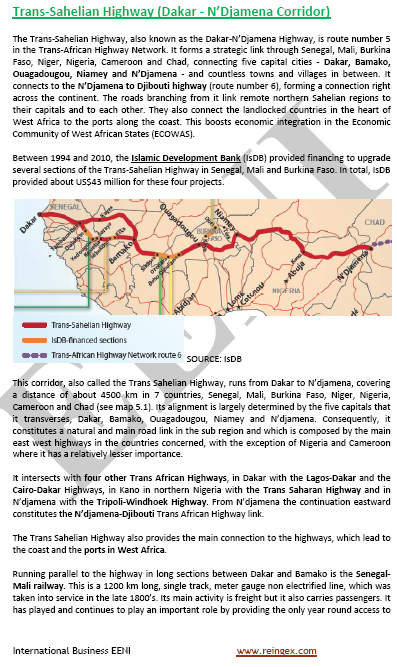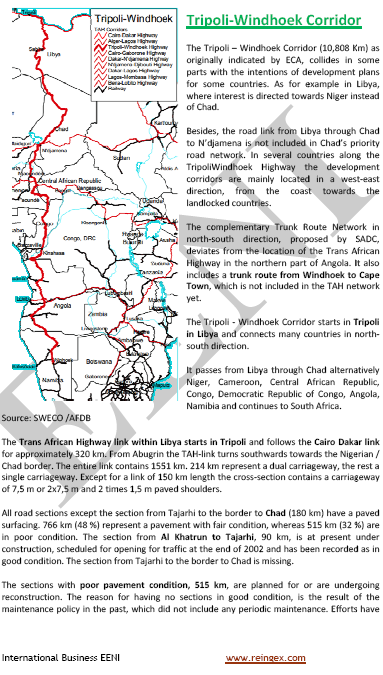Economic Community Central African (ECCAS)

Economic Community of Central African States (ECCAS) Common Market, Customs Union
- Introduction to the Economic Community of Central African States (ECCAS /CEEAC)
- History of the Economic Community of Central African States
- Structure of the Economic Community
- Aims of the Economic Community of Central African States
- Main institutions of the Economic Community of Central African States
- Areas of intervention of the ECCAS
- Trade liberalization
- Preferential tariff, transit regime and rules of origin of the Economic Community of Central African States
- Customs Union
- Customs Duties elimination
- External common customs tariff
- Non-tariff Barriers to intra-community trade
- Most-favoured-nation treatment
- Re-export of goods and intra-community transit
- Cooperation on monetary, financial, and payments fields
- Cooperation on agriculture and food
- Cooperation on infrastructure and equipment, transportation, and communications
- Specialized agencies of the ECCAS
- Regional Commission for Fisheries of the Gulf of Guinea
- Commission of Central African Forests
- Power Pool of Central Africa
- Projects and programs
- Integration of Indigenous Peoples
- Responsible Management of Protected Areas
- Sustainable development for integration
- Protect our wildlife against poaching
- Anti poaching and illegal ivory trade
- Integration through the agriculture
- Green economic development in Central Africa
- Protect the wildlife against poaching
- Integrated Water Resources Management
- Business in the Central African Countries (Economic affairs, international trade...)
The objectives of the subject “Economic Community of Central African States (ECCAS)” are the following:
- To understand the goals, functions, and specialized agencies of the ECCAS
- To assess the benefits for the member countries of the ECCAS and the areas of cooperation
- To know the socio-economic development of the Central African Countries
- To analyze the economic and the trade integration process between the ECCAS member countries
- To explore the impact of illegal trade of ivory and the green economic development in Central Africa
Economic Community of Central African States (ECCAS)
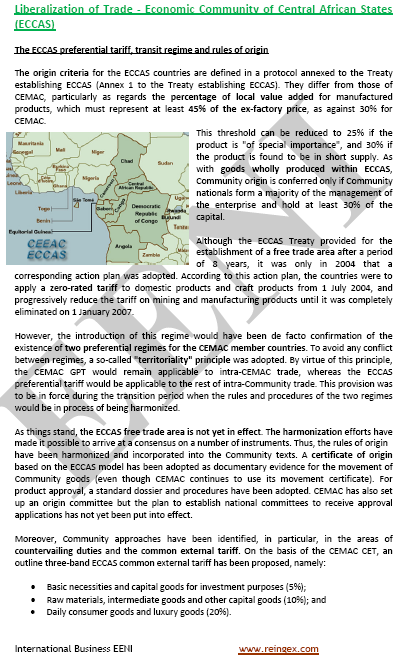

The Subject “Economic Community of Central African States” belongs to the following Online Programs taught by EENI Global Business School:
Doctorate: African Business, World Trade.
Masters: Business in Africa, International Business, Foreign Trade.
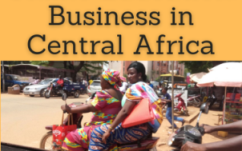
Languages:  or
or  Communauté Économique des États de l’Afrique centrale CEEAC
Communauté Économique des États de l’Afrique centrale CEEAC  Comunidad Económica Estados África Central CEEAC
Comunidad Económica Estados África Central CEEAC  Comunidade Económica Estados da África Central CEEAC.
Comunidade Económica Estados da África Central CEEAC.
Credits of the Subject “Economic Community of Central African States (ECCAS)”: 1 
Neither the customs union nor the free-trade area of the ECCAS is still in operation.

Masters adapted to:

Economic Community of Central African States (ECCAS).
The main objective of the ECCAS is to promote the regional economic cooperation and set-up a Central African Common Market.
The Economic Community of Central African States (ECCCAS) Member States are Angola, Burundi, Cameroon, Central African Republic, Chad, DR Congo, Equatorial Guinea, Gabon, Republic of the Congo, Rwanda, and São Tomé and Príncipe.
- Rwanda was a founding member but left the ECCAS in 2007 to join the East African Community (EAC)
- In 1983 was created the ECCAS by the members of the Customs and Economic Union of Central Africa and the Economic Community of the Great Lakes States (Burundi, Rwanda, Zaire, and Congo) as well as São Tomé and Príncipe
- The Economic Community of Central African States (ECCAS) has been inactive from 1992 to 1998
- The Economic Community of Central African States has overlapping countries with the Central African Economic and Monetary Community (CEMAC): Chad, the Central African Republic, Congo-Brazzaville, Gabon, Equatorial Guinea, and São Tomé and Príncipe
- The official languages of the ECCAS are French and Portuguese
- The population of ECCAS countries: 145 million inhabitants
- The headquarters of the Central African Economic and Monetary Community (ECCAS): Libreville (Gabon)
- On 24 January 2003, the EU concluded a financial agreement with the ECCAS and the CEMAC conditioned to peace and security strengthening in Central Africa
All the ECCAS countries have Christian majorities, except Chad, which has a Muslim majority.
The ECCAS belongs to the Central African Economic Area.
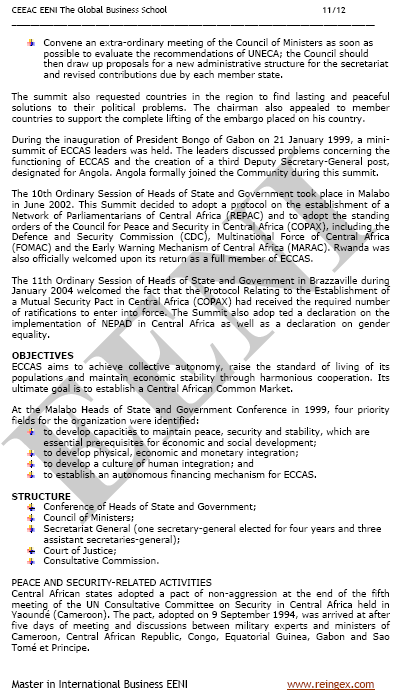
Main Trans-African corridors in the ECCAS region.
Largest ports in the ECCAS:
- Port of Douala (Cameroon)
- Port of Lobito and Port of Luanda (Angola)
- Port of Pointe Noire (Congo)
- Port of Malabo (Equatorial Guinea)
- Port of Libreville
